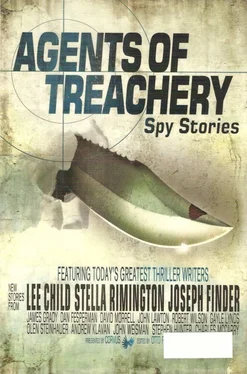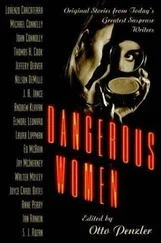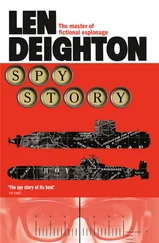“Personal?” Randall said, shouting despite himself. “I really should advise you to see the counselor.”
“You probably should.”
Silence followed, and Randall found a pen on his desk to twirl. “It’s ridiculous, Sam, and you know it. I know you’re upset about what happened to Lorenzo and Saïd, but it wasn’t your fault. Hell, it probably wasn’t even that idiot Paul Fisher’s fault. It just happened, and I’m not going to lose one of our best agents over this. You can see that, can’t you?”
Sam’s face gave no sign either way.
“Post-traumatic stress disorder. That’s what’s going on here, you know. It’s a sickness.”
Sam blinked slowly at him.
“I won’t insist on the therapist-not yet -but I am insisting on the vacation. Aren’t you supposed to go car racing next week?”
“Cross-country rally.”
“Good. Write up a report on the fiasco and then take three weeks.”
Sam was already on his feet, nodding.
“Keep safe,” Randall told him, “and do consider the therapist. Voluntarily. I’ll not lose you.”
But Sam was already out the door.
***
There had been an unexpected storm along the south side of snowcapped Mount Kenya that morning, and so by noon he was soaked with mud, and by late afternoon it had dried to a crust, turning his clothes into a lizard skin of hard scales. But he went on. His empty passenger seat set him apart from most of the Europeans and Americans taking part in the rally, and when asked, he told them his partner had dropped out because of business obligations, an excuse they all understood.
At the end of each day, they drank together in tents set up by their Kenyan hosts. The Italians were loud, the French condescending, the Brits sneering, the Americans annoyingly boisterous. A hive of multinational caricatures bound together by speed and beer, business and tall tales about women they’d had. These things were, he reflected, the lifeblood of Western masculinity.
It was Friday, two days before the end of the race, when through his exhausted eyes and muddy goggles he saw Benjamin Muoki standing among the T-shirted organizers wearing a suit, one hand on his hip, and no expression on his face. In his other hand was a bottle of Tusker lager. Sam pulled up amid the other drivers’ shouts and hoots, flipped up his goggles, and nodded at Benjamin, who took the cue and wandered away from the camp. Sam checked his time, rinsed off, and changed into shorts, a blue cotton button-up, and leather sandals from his waterproof bag. By then, Benjamin was a silhouette against a backdrop of fading mountains. Sam had to run to catch up with him.
“Here,” Benjamin said, holding out his beer. “You need it more than I do.”
They shared the bottle in silence, walking slowly, until Benjamin remembered and said, “You’re nearly the last one in.”
“The rain does it to me.”
“I’ll pray for clear skies.”
“The sun is even worse.”
Having known each other for three years, the men used the exchange of pass phrases not to recognize each other, but to signal if one or the other was compromised. “But really,” said Benjamin, “are you driving well?”
“I’m surviving.”
“It’s a difficult course.”
They paused and looked back at the bustling activity of the camp. Lights flickered on to hold back the encroaching dark. A dusty wind came at them, raising little tornadoes, then died down. “Did you receive the instructions?” Sam asked.
“I’m here, aren’t I?”
“I mean the rest of it.”
“Yes.”
“And?”
“What would you like me to say? That I think it’s dangerous? I’ve said that about too many of your plans to keep on with it.”
“But do you see any obvious flaws?”
“Just that you’ll end up dead.”
Sam didn’t answer; he was too tired to lie convincingly.
Benjamin looked into his face. “A life for a life? It’s a lot to pay.”
“More than one life, we hope.”
“We,” Benjamin said quietly. “I had a talk with your fat attaché. I don’t think he knows the first thing about this.”
Sam felt his expression betraying too much. “You told him?”
“No, Sam. I felt around some. I’m good at that.”
“Good.”
“It’s not on the books, is it?”
“It’s above his clearance,” Sam lied, but it was an easy lie. “The computer finished?”
“By Monday.”
“I’ll be back next Wednesday.”
“So I’ll give it to you then.”
“Not me. You’ll give it to someone else.”
A light seemed to go on in Benjamin’s always-astute eyes. “Someone even more foolish than you?”
“I’ll let you know. You’ll give it to him, but you won’t say a thing about it. You’re a good enough liar for that, aren’t you?”
Benjamin’s expression faltered. “This is a very stupid man?”
“A nervous man. Just give him the case. He knows what to do with it.”
“He knows he’ll die?”
“You’re full of questions, Benjamin. We’re paying you well enough, aren’t we?”
“You have always paid well, Sam.”
***
On Monday, as he sat across from Paul Fisher in the Aeroport International de Genève, he wondered why he was pushing it so far. Was he pushing it too far? He hadn’t seen Paul since that bar in Rome, and now that they were face-to-face again the prospect of killing him here, now, seemed much more inviting. Easier. More wholesome.
But he’d begun to fall in love with the balance of his plan. One bomb would take out not only the man indirectly responsible for Saïd’s gruesome murder, but also the man who had worked the blade through the muscles and bone. Now it was just a matter of persuasion. So after the invention of the technology that would wash bank accounts clean, he assured Paul that he wouldn’t be alone-Sam would be there, right by his side, to authorize the transfer with his index finger. That seemed to calm him. Then he told Paul what they both knew, that he wasn’t cut out for this kind of work and never had been. “Consider this a chance to redeem yourself,” Sam said, and it felt as if, through lies, he had cut to a deeper truth than he ever could have come upon honestly.
His love of the plan kept him moving forward even when, on Wednesday, Saïd’s murderer told him his real name and the name of his employer. Sam had put too much work into the plan to let it fall apart now, so he improvised. He absorbed this discovery into his tale, and even encouraged Nabil to murder Paul. He admitted the issue was personal. It was reckless, yes, but his sense of the rightness and beauty of his plan had made him delirious.
Yet it was too late. He realized his mistake only when they plucked him off the street and drove him out of town to that finely appointed house. Even then, however, he clung to hope. They still wanted the money, and if necessary he would type in the code himself. He would prefer if Paul were beside him to accept the blast as well, but he would make do with what was possible.
What he never expected was the politician sitting with a scotch in the living room, the fat one with the round eyes that stared in horror as he was dragged in. Their eyes met, but neither said a thing. Surprise kept them both mute. His captors dragged him to the basement and locked the door, and Sam settled at the table, thinking through the implications of Daniel Kwambai working with Aslim Taslam.
As if he’d read Sam’s mind, some ten minutes later Kwambai opened the door and stepped inside wearing a wrinkled linen jacket stretched on one side by something heavy in the pocket. He closed the door and stared at Sam. “What are you doing here?” came his falsetto whisper.
Читать дальше












